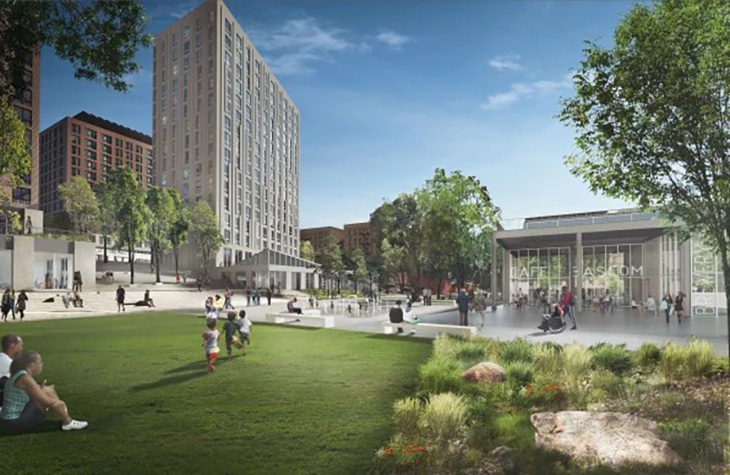
A brand new community housing development is being put up in the Bronx, and it will have one of the coolest machines you can find on the planet. This machine happens to be an on-site aerobic digester meant to turn 1,100 pounds of food scraps into 220 pounds of high-quality fertilizer. And it will do this every single day.
Developed and manufactured by Harp Renewables, the machine is described as a ‘big stomach filled with bacteria that breaks down food scraps and wasted food into their component parts.’ And in the near future, it can actually become a standard appliance in every single apartment unit to lessen the amount of food waste in America. That’s because according to the United States Environmental Protection, the United States reaches 30% of the total mass of all trash collection.
Organized by Gilbane Development Company, The Peninsula – which is what the housing development is called – will have ‘740 units of affordable housing, 50,000 square-foot light industrial space and equal sized green space, and 15,000 feet of commercial space.’ And all of these areas will be able to send their castaway comestibles straight into the digester for decomposing.
According to a report in Fast Company, founder of a zero-waste food management company, Christina Grace, aided in planning the design and implementation of the digester into The Peninsula. She also helped organize a 40% grant from the city, which paid $50,000 of the upfront cost of the project.
Grace explained to Fast Company, “The goal is for this material to work its way into the community garden network in the Bronx.” She also added that she expects the project to pay for itself over a span of just a few years.
“We see this as highly replicable in both commercial and residential venues. We know there’s a need for fertilizer,” she added.
Moreover, by producing the fertilizer in the city also helps lessen the need for it to be trucked in from far off areas, which in turn aids in lessening the infamous NYC traffic problem.
A Monumental Problem Solver
Additionally, another wonderful and uncommon problem that the digester can help solve is the share of the Bronx’s rodent problem within the city. In fact, if you’ve ever watched the documentary called Rats by Morgan Spurlock, then you’re aware of just how crazy the rat issue is in the city, where rodents out number people by around 8 or 10 to one.
Moreover, bio-digesters can also possibly help another huge problem, which is pollution and greenhouse gas emissions. That’s because fertilizer is one of the biggest emitters of three of the most-targeted GHGs. Fertilizer, much like ammonia and quarry dust, as well as many other commodities, are usually imported from countries who specialize in their production, like Norway. But other nations, such as Ukraine and Russia, is another large exporter of fertilizer, and because of their ongoing conflict, have affected the world’s supply chain, showing just how fragile it can be, while increasing prices all over the world as well, throwing off certain country’s economies.
In addition, because of importation of fertilizers, there are tons of CO2 that get emitted through the transport process. Meanwhile, the production of ammonia is one of the bigger CO2 emitting processes because of the use of fossil fuels during its manufacturing process. Even natural fertilizers and landfill decomposition produce large amounts methane, adding to harmful greenhouse gases.
By design, bio-digesters already keep the CO2 and methane that’s produced in the fertilizer instead of allowing it to be released in the atmosphere. Because of this, the aerobic bio-digester is making its way into residential and industrial spaces across the United States little by little.
Good News Network even did a report on one of the biggest bio-digesters in the country, located in the resource (sewage) recovery center located outside the capital of D.C., as well as on the use of bio-digesters in other areas around the world, such as in Australian pig farms, which help reduce the environmental and psychological impact of the effluent that is made due to their operations.
In a tweet from Harp Renewables, they shared their joy at having installed their own bio-digester in Cashel, a town in Ireland.
Another successful installation was completed by @Nuplanetss at Cashel Palace Hotel.
The Harp CX2 Biodigester can digest up to 2000L of waste per week. Our industry-leading technology reduces the waste volume and weight by up to 85% in less than 24h. pic.twitter.com/lZwSYB9h8i
— Harp Renewables (@Harp_Renewables) August 20, 2021
What are your thoughts? Please comment below and share this news!
True Activist / Report a typo


